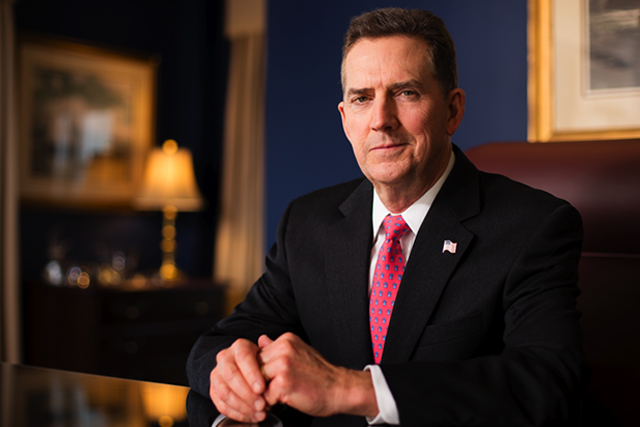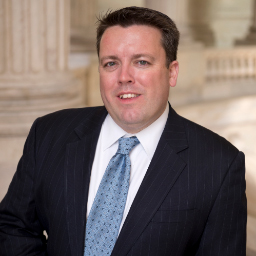Politico Failed to Disclose Lobbying Work of Heritage Foundation Critics
Rob Bluey /
Steve LaTourette, John Feehery and Brian Walsh toiled in the halls of Congress for years before cashing in for lucrative jobs in Washington’s burgeoning public affairs and lobbying industry.
Today, the three Republicans are at the forefront of the GOP establishment’s clash with conservatives and the Tea Party. They are also among the most quoted critics of The Heritage Foundation and Heritage Action for America, each figuring prominently in a story published this week by Politico Magazine, “Is Jim DeMint the Most Hated Man in Washington?”
The 2,500-word story by Pema Levy, a Washington correspondent for Newsweek, described these critics in connection to their former jobs. The story failed to acknowledge that they often are paid to argue against Heritage’s positions on policy issues.
Here’s how Levy described each:
- LaTourette as “a friend and political ally of the [House] speaker’s” and “a moderate who now runs the Republican Main Street Partnership, a policy shop that associates itself with the ‘governing wing of the Republican Party.’ ”
- Feehery as “a veteran Capitol Hill aide who worked for the Republican House leadership.”
- Walsh as a “Republican consultant … who spent the 2010 and 2012 cycles working to elect a Republican Senate majority at the National Republican Senatorial Committee” and “publicly scolded DeMint and Tea Party groups over their shutdown strategy this past summer.”
On policy issues such as immigration reform, the men are at odds with Heritage and Heritage Action. On others, like the Internet sales tax and the wind production tax credit, they have been stymied in their pursuit of those policy proposals.
Levy, who previously worked at liberal media outlets Talking Points Memo and The American Prospect as well as the International Business Times, neglected to disclose the three men’s work on behalf of any of these causes or their current roles in the lobbying and public affairs industry.
Heritage’s Geoff Lysaught, group vice president for strategic communications and publisher of The Foundry, said Politico erred by neglecting to reveal this information to its readers.
“I can only assume that this article slipped through Politico’s standard editorial process,” Lysaught said. “Allowing a reporter with clear liberal bias to develop a story about the effectiveness of Heritage based largely on the opinions of lobbyists paid to advocate against Heritage’s positions is of dubious journalistic merit.”
The Foundry asked Politico Magazine editor in chief Susan Glasser why the publication did not acknowledge the lobbying and public affairs work of LaTourette, Feehery and Walsh—or the paid work they are doing on behalf of clients. In an email to The Foundry, Glasser said, “The story made clear these folks had major political and policy disagreements with Heritage and disclosed that.”
What Wasn’t Disclosed by Politico
In the case of LaTourette, 18 years as a congressman representing northeast Ohio led to several opportunities: leader of the center-left Main Street Partnership (“Republican” is no longer part of the name), work on behalf of the Main Street Advocacy fund and Defending Main Street SuperPAC, and lobbyist at McDonald Hopkins Government Strategies. LaTourette’s life after Congress prompted a 1,600-word exposé in the New York Times earlier this year.
For Feehery and Walsh, the path to K Street didn’t require election to Congress. Both served in communications roles on Capitol Hill, working for some of the most powerful members of Congress, then leveraging those opportunities for their current jobs in lobbying and public affairs.
Feehery is president of QGA Communications, part of the lobbying firm founded by former Republican National Committee chairman Ed Gillespie and Jack Quinn, a former counsel to President Bill Clinton. Feehery previously worked at Barbour, Griffith and Rogers, and also spent several years on Capitol Hill with top Republicans such as House Speaker Dennis Hastert, Majority Whip Tom DeLay and House Minority Leader Bob Michel.
Walsh is a partner at Singer Bonjean Strategies, where he works on public affairs and strategic communications. Prior to joining the firm, he worked at the National Republican Senatorial Committee, served as an aide to Representative Bob Barr (R-GA), Senator John Cornyn (R-TX), and got his start in Washington at The Heritage Foundation.
Differences on Immigration
Immigration is among the most notable examples where LaTourette, Feehery and Walsh disagree with Heritage and Heritage Action. Feehery and Walsh are also being paid to lobby for or promote amnesty for illegal immigrants. LaTourette registered as a lobbyist in February, although it’s not clear if his clients are paying him to do work on immigration.
According to publicly available lobbying disclosure records, Feehery lobbied the House and Senate on S. 744, the Senate-passed “immigration reform” bill. The measure, which Heritage has called amnesty, is stalled in the House of Representatives.
Feehery’s client was NILC Immigrant Justice Fund (on behalf of CAMBIO). On June 27, NILC’s executive director, Marielena Hincapié, boasted: “Senate finally has recognized that our immigration system is broken and has voted to create a road to citizenship for millions.”
In an e-mail to The Foundry, Walsh said he does consulting work for Americans for a Conservative Direction, which is affiliated with Facebook founder Mark Zuckerberg’s FWD.us political action group. Americans for a Conservative Direction has spent millions of dollars to advocate immigration reform with “a path to citizenship” and bolster Republicans in Congress who favor passage of such legislation.
LaTourette, meanwhile, consistently has advocated for Republicans to pass immigration reform that includes amnesty. Writing for the Cleveland Plain Dealer last year, LaTourette argued:
It would be foolish to ignore the economic benefits of immigration reform, and more foolish politically to fail to act. I believe immigration reform is important to our economy and must be passed as soon as possible. … I also believe as a Republican that it is critical for Republicans to support reform if we want to be viable in future elections.
Heritage Action urged lawmakers to oppose S. 744 last year. Heritage research, meanwhile, documented the staggering costs of amnesty.
Other Policy Differences
Immigration isn’t the only policy area that puts Feehery and Walsh at odds with Heritage and Heritage Action.
Walsh does consulting work for the Marketplace Fairness Coalition as well. Its top priority, an Internet sales tax, was derailed last year when conservative groups, including Heritage Action, rose up to oppose the Marketplace Fairness Act.
In an e-mail to The Foundry, Walsh argued that “there are many conservatives who support both immigration reform and marketplace fairness.” In the Senate, the Internet sales tax bill attracted the support of 20 Republicans and opposition from 23. The immigration bill won the backing of 13 Republicans, compared to 32 who opposed amnesty.
Feehery lobbied on behalf of NextEra Energy in 2013. The company paid Feehery’s employer $145,000 to lobby for an extension of the wind production tax credit, which expired at the end of the year. According to disclosure forms, Feehery served as the firm’s sole lobbyist on the account.
“It is no secret that I support immigration reform and renewable energy,” Feehery told The Foundry. “I am proud of my work on both projects.”
He added: “I don’t disagree with Heritage on policy. I disagree with their political efforts that undermine the Republican Party. And I am not alone in that sentiment, which is widely shared by most Republicans.”
‘A Question for Politico’
When asked if Levy and Politico Magazine should have acknowledged his paid lobbying work, Feehery said, “I don’t think it is in any way relevant.”
Walsh said his criticism of DeMint dates to before he left the Senate for Heritage. Walsh also disputed the idea that his paid public affairs work influenced his decision to speak out against Heritage. “[H]ow is any of that even remotely relevant to my very fair criticism of your new leadership’s tactics?” he said in an e-mail.
Christopher Barron, a spokesman for LaTourette, said nothing in Politico’s story appeared problematic from his perspective.
“I think that’s a question for Politico,” Barron said. “Any questions about what Congressman LaTourette has done on behalf of any of his clients is completely and totally an open book. All that stuff is publicly available.”
This story was produced by The Foundry’s news team. Nothing here should be construed as necessarily reflecting the views of The Heritage Foundation.







